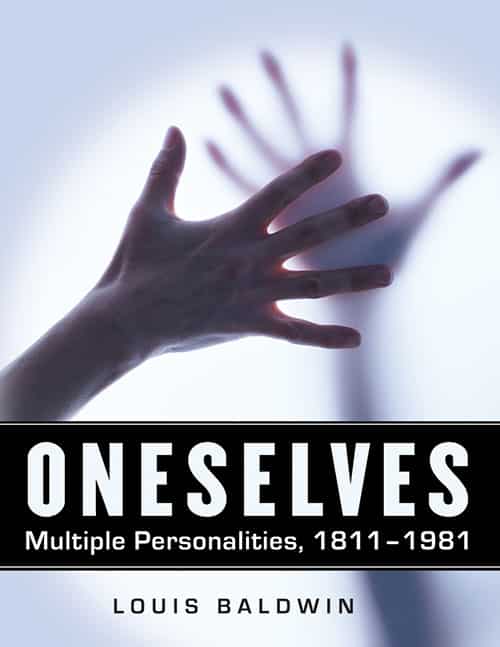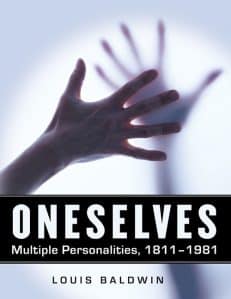Oneselves
Multiple Personalities, 1811–1981
$19.99
In stock
About the Book
In the 1970s some 50 cases of multiple personality were reported; there had been 90 in the previous 150 years. This book presents 28 case histories, from the earliest identifiable case in 1811 to a widely publicized one in the 1980s.
These fascinating histories illustrate a wide variety of symptoms and behavior—the very factors that make diagnosis so difficult. The cases show that the causes of multiple personality disorders can range from deep and complicated psychological traumas to a simple physical injury like a blow to the head. Associated phenomena include chronic sleepwalking, persistent time loss, epilepsy, automatic writing, hallucination and several kinds and degrees of amnesia.
About the Author(s)
Bibliographic Details
Louis Baldwin
Format: softcover (5.5 x 8.5)
Pages: 175
Bibliographic Info: bibliography, index
Copyright Date: 2012 [1984]
pISBN: 978-0-7864-6719-8
eISBN: 978-0-7864-8767-7
Imprint: McFarland
Table of Contents
Table of Contents
Foreword ix
Mary Reynolds (1811)
The manic can escape from the depressive. 1
Ansel Bourne (1887)
“Mr. Bourne’s skull today still covers two distinct personal selves.”- William James. 5
Alma (1893)
If a pathological condition brings contentment, should a therapist interfere with it? 8
Joseph Hoover (1894)
Solid respectability cannot guarantee a solid personality. 12
Peter Scott (1894)
His dissociation, whatever its cause, was triggered by escaping gas. 14
Helene Smith (1899)
Even a successful businesswoman needs romance in her life. 18
Charles Warren (1901)
From the time of the railroad accident, his blackout lasted 17 years. 21
George Robertson (1901)
The three personalities were quite different, yet all answered to the same name, and all were inveterate travelers. 25
John Kinsel (1903)
Here was a man who could reply to his doctor’s greeting, “How are you this morning?” with “I’m asleep; I’ve been asleep since eight o’clock.” 30
Victor Laval (1904)
Four of his six personalities suffered from paralysis, but of different parts of his body. 38
Thomas Hanna (1905)
He could hardly have been a more “normal” type of person; but he fell and struck his head-and returned to infancy. 42
Mary Vaughn (1905)
Hers was a rare case of certified insanity. 52
Christine Beauchamp (1905)
In this famous case, Sally made life miserable for Mary until Christine came along. 56
Irene (1907)
She nursed her mother through a long terminal illness and then escaped into another personality. 63
Doris Fischer (1915 )
It’s not easy for a quiet, diffident type to live in the same body with an incorrigible mischiefmaker. 65
Patience Worth (1919)
In one personality, she was an ordinary housewife with no particular literary talent; in the other, a literary genius. 75
Alice (1919)
If Alice had been Spanish, there might never have been any need for Bonita. But Alice wasn’t Spanish. 78
Violet (1922)
She was an intelligent, charming, apparently normal woman, but under the spell of automatic writing she became a whole cast of colorful characters. 81
Mabel (1931)
The principal alternate personality was named Miss Dignity, with more than a touch of irony. 86
John Charles Poultney (1933)
What finally healed him, curiously enough, was the sudden memory of a pet monkey. 89
Harriet (1933)
Movies were an important part of her life, including home movies of her various personalities. 95
Eve White/ Chris Costner (1954)
In this celebrated case, the touch of a face proved disastrous. 101
Gloria (1972)
“Give me a minute,” she heard her father tell his girlfriend, “to get rid of the brat.” 110
Carmen Garcia (1973)
Charlie was the boy she wanted to be. 113
Sybil Dorsett (1973)
We often use the phrase, “a shattering experience,” but for Sybil it was no mere metaphor. 119
Jonah (1974)
At long last, thorough clinical testing was introduced. 135
Henry Hawksworth (1977)
Can a cold shower be disintegrating? 140
William Milligan (1981)
Can the punishment fit the crime? 146
Bibliography 157
Index 161
Book Reviews & Awards
- “Immensely readable accounts of famous and not-so-famous cases of multiple personality”—Columbia Road Review





